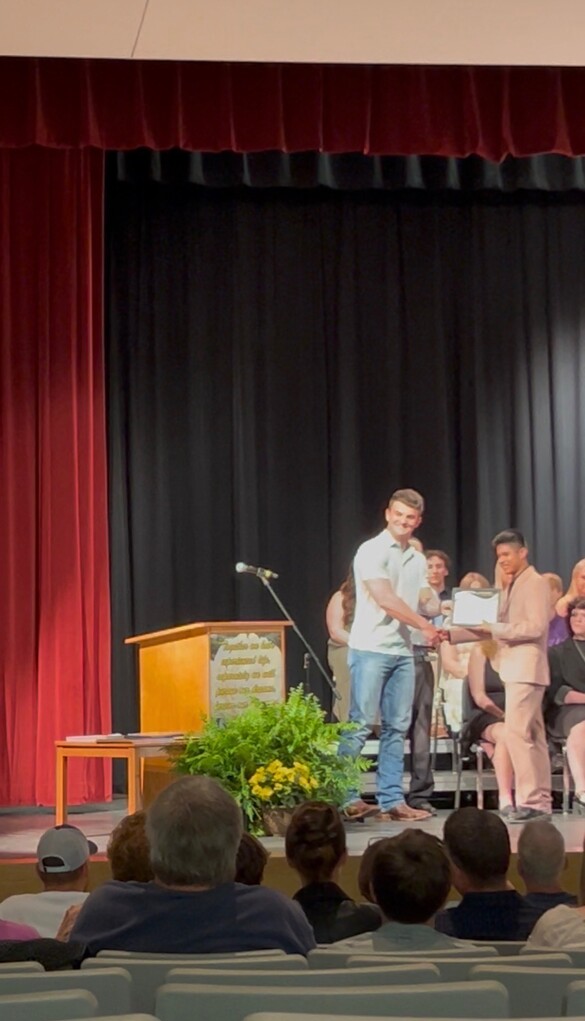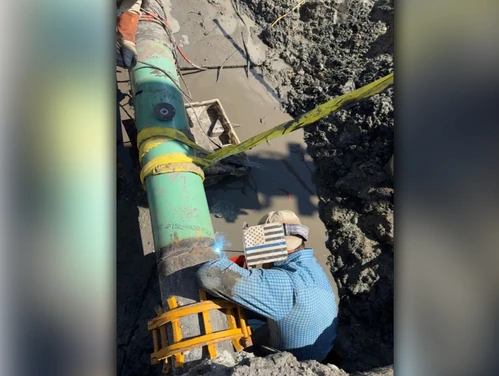As a student at Atlantic High School, Jackson McLaren realized that he didn't want his future education to include more classrooms and a traditional four-year college degree.
Fortunately for McLaren, Atlantic High School agriculture teacher Eric Miller encouraged him to try his hand at welding, noting that it would provide him a high-paying pathway to a stable career and growth that would align with his skills and interests.
McLaren graduated from Atlantic in 2023. Thanks to the strong welding background he received at Atlantic, he completed his trade school curriculum at Midwest Welding Academy in Sioux City in less than five months and immediately entered the workforce with a position as a pipe welder for Northern Natural Gas.

"Atlantic really taught us the basics of welding, and you learn a lot in the real world," McLaren said. "Trade school allowed me to master my skills, but having a head start definitely benefited me. It takes most people a year to finish."
Atlantic's welding program typically enrolls 40 to 50 students per semester. Miller, school counselor Alyssa Boltz and work-based learning coordinator Mary McLaren also collaborated with Vermeer's welding facility in Griswold to create a welding apprenticeship program that mirrored a successful program Vermeer had instituted in Pella.
In addition to Vermeer, Atlantic has leaned on other local businesses and industries, such as Industrial Steam, with the hope of training and retaining local talent in the community and accelerating their path to completing a registered apprenticeship.
"There was a lot of research that went into the program and working with the Iowa Department of Education in looking at the coursework and workplace experiences the program needed to get it off the ground," Boltz said. "If we can successfully get the student through the program, they would only need about 900 more hours to complete their apprenticeship, and our goal is to have them complete that by December after they graduate."
Welding and other manufacturing trades are one of six Career and Technical Education (CTE) content areas that students in Iowa can pursue. Programs in those fields include a sequence of courses that prepare individuals for employment in current or emerging occupations. Programs include competency-based applied learning, which contributes to an individual’s academic knowledge, higher-order reasoning and problem-solving skills, work attitudes, general employability skills, and occupational-specific skills.
“Building foundational welding skills gives Iowa students a direct pathway into some of the state’s most in-demand and well-paying careers,” said Iowa Department of Education Educational Program Consultant for Applied Sciences/Industrial Technology Cale Hutchings. “Beyond the technical expertise, welding instruction strengthens critical thinking, problem-solving, and communication, some of the cognitive and employability skills Iowa employers value most. Together, these abilities prepare students for success in the skilled trades and in any future career path.”
Miller spends four to six weeks covering basic safety before engaging in six different types of welding projects, including stick welding, MIG welding, torch welding, plasma cutters and advanced welding. Students continue to build on that foundation by progressing into independent studies on more advanced welding techniques, while also helping guide younger students in learning some of those basic skills.
"I think CTE programs are some of the most important things our schools can offer," Miller said. "Some of these kids do not want to go down a traditional four-year college program, and I think a lot of them will have a better future going into a program in the trades."
McLaren was one of those students who seized the opportunity to chart a course for himself in a high-demand field without a four-year degree.
"I really took advantage of that opportunity, and that was my golden ticket," McLaren said.
However, McLaren didn't just take that ticket and run. Shortly after securing full-time employment, he established a scholarship in his name that annually provides two $750 scholarships for students from Atlantic to continue their education in the trades beyond high school.
His contributions extend far beyond providing scholarships as well. He is one of many former Atlantic students who return to the welding room to provide instruction and guidance to current students.
"We've got a handful of former students who will come in and spend a day working with students and then come back every few weeks to check in, give advice and pointers," Miller said. "That's been really beneficial to our program because many of the students were freshmen when Jackson was a senior, and they look up to him and know he's a good welder."
McLaren cherishes the ability not only to help make trade school more affordable and provide guidance to former classmates, but also to highlight the opportunities available to students like him and advocate for the need to offer those opportunities to future generations.
"I'm extremely blessed now with a ton of great opportunities. I'm very fortunate for the job I have and to be able to give back now," McLaren said. "I think trade school is extremely important, and I say that if there's any kid that wants a chance to be in an apprenticeship, they need to have that chance."
